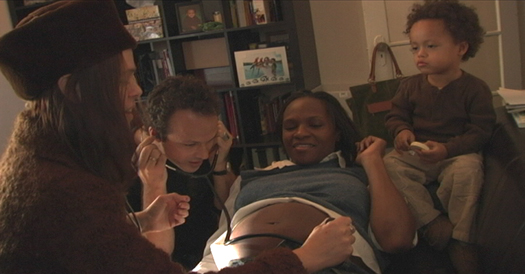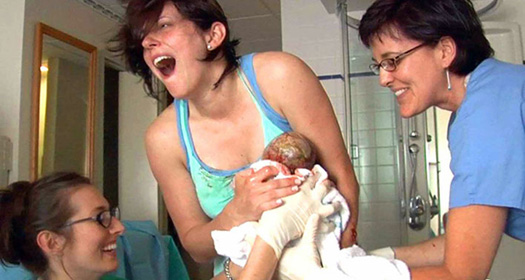| Reviews & Columns |
|
Reviews DVD TV on DVD Blu-ray 4K UHD International DVDs In Theaters Reviews by Studio Video Games Features Collector Series DVDs Easter Egg Database Interviews DVD Talk Radio Feature Articles Columns Anime Talk DVD Savant Horror DVDs The M.O.D. Squad Art House HD Talk Silent DVD
|
DVD Talk Forum |
|
|
| Resources |
|
DVD Price Search Customer Service #'s RCE Info Links |
|
Columns
|
|
|
Business of Being Born, The
The Business of Being Born marshals a host of statistics to support the proposition that natural childbirth attended by a midwife is generally preferable to a hospital birth attended by an obstetrician. The United States spends more than twice as much as any other country per birth, yet it has the second worst newborn death rate in the developed world. Delivery by Cesarean section, a major surgical procedure, occurs in one-third of deliveries in the United States, but is rare elsewhere. Epstein and executive producer Ricki Lake attribute much of this disparity in spending and health outcomes to the unnecessary medicalization of childbirth in the United States. In Europe and Japan, 70 percent of births are attended by midwives, but less than 8 percent are in the United States. In the Netherlands, one-third of childbirths occur at home, but in the United States less than one percent do.

Epstein interviews experts on both sides of the debate though the weight of the testimony is decidedly on the side of natural birth. Along with several American midwives, Epstein interviews a number of foreign health officials and obstetricians who favor midwives for most childbirths, reserving obstetricians for complicated births. These experts argue that the medicalization of birthing favors the interests of obstetricians and hospitals over that of laboring women and newborns. The hospitals have an incentive to hurry the birthing process to free beds, and obstetricians have an incentive to use increasing levels of interdiction culminating in Cesarean sections to expedite the deliveries, increase their fees, and reduce litigation risks.
Even the nearly ubiquitous practice of having women deliver while lying on their backs is challenged: while this position makes it easy for the obstetrician to work, it narrows the birth canal making the labor more difficult. The preferred method, apparently, is for women to stand through most of labor and then move into a tub or pool of water toward the end.
Epstein interviews obstetricians who advocate for the medicalization of childbirth but none of these physicians have even seen a natural childbirth, are misinformed about the process, and are generally dismissive of natural childbirth out of hand. The obstetricians liken natural childbirth to macho posturing, and question the training and preparation of midwives.
A number of graphic child-birthing segments are included in the documentary. The ones occurring in hospitals document the disparity of power between a laboring woman and her obstetrician. A woman in the midst of the pain of childbirth, lying on her back surrounded by medical staff, is told she needs some intervention to avoid risking the baby's life. That first intervention is followed by another, and another, until the woman who wanted a near-natural childbirth is doped up and delivering a baby by suction, and once born the baby is whisked off by a nurse. These scenes are contrasted with a number of home deliveries including that of Ricki Lake. While these natural deliveries show the women in a lot of pain and often questioning what they could have been thinking when they decided to forgo an epidural, the women are surrounded by loved ones and for each, the moment of birth appears to be something far more joyous than that of a hospital birth. These women are literally reaching down, pulling their newborns out, and clutching them straight to their bosoms, often while simultaneously laughing and crying: quite a sight to behold.

During the filmmaking, Epstein got pregnant and her childbirth becomes the focus of the last third of the documentary. Epstein and her partner Paulo Netto, who is also the director of photography, choose to have a natural childbirth at home. That decision is complicated when Epstein goes into labor months early. When the midwife arrives, she determines that the birth will be breech. After a hurried discussion of the options, Epstein is rushed to the hospital and delivers by Cesarean section. Far from a refutation of home birth, Epstein's complicated delivery serves to demonstrate how a well-orchestrated birth can quickly shift from home to hospital when the situation warrants.
To the credit of this documentary, Epstein and Lake stop short of the polemics of Michael Moore. The weight of the material is clearly tipped toward natural childbirth, and Epstein and Lake implicitly frame the issue as a matter of feminist empowerment, but they stop short of vilifying the medical profession. In sum, they favor natural childbirth backed up by the option of hospital delivery.
The mix of intimate handheld digital video of hospital and home deliveries, archival footage, and interviews is well done, though the score is often heavy-handed in setting the mood and underscoring points that the filmmakers agree with.
The Video:
The Business of Being Born is presented in a letterboxed 1.78:1 aspect ratio. Shot on standard DV, the image is adequate for this small-scale documentary production though hardly outstanding.
The Audio:
The DVD provides only a 2.0 stereo track with little noticeable separation between the channels. Much of the dialogue, captured using the camera mic, is muffled. Unfortunately, the only subtitles provided are in Spanish.
The Extras:
The extras consist of 28 minutes of additional scenes, opening night Q&A (6 min.), and the theatrical trailer.
Final Thoughts:
The Business of Being Born makes a persuasive, albeit largely one-sided, case against the medicalization of child birth. Hopefully, this documentary will help prompt a debate in the United States about why it is that we spend more per childbirth than any other country and yet have considerably worse outcomes, and what can be done about it. The Business of Being Born is highly recommended to all expecting parents.
|
| Popular Reviews |
| Sponsored Links |
|
|
| Sponsored Links |
|
|
| Release List | Reviews | Shop | Newsletter | Forum | DVD Giveaways | Blu-Ray | Advertise |
|
Copyright 2024 DVDTalk.com All Rights Reserved. Legal Info, Privacy Policy, Terms of Use,
Manage Preferences,
Your Privacy Choices | |||||||














